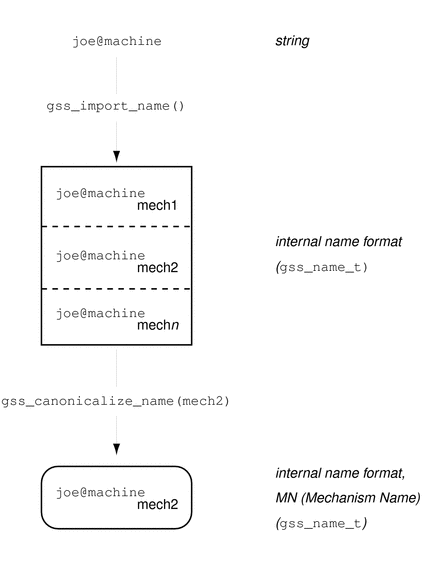Names in GSS-API
A name refers to a principal. In network-security terminology, a principal is a user, a program, or a machine. Principals can be either clients or servers.
Some examples of principals are:
-
A user, such as user@machine, who logs into another machine
-
A network service, such as nfs@machine
-
A machine, such as myHost@eng.company.com, that runs an application
In GSS-API, names are stored as a gss_name_t object, which is opaque to the application. Names are converted from gss_buffer_t objects to the gss_name_t form by the gss_import_name() function. Every imported name has an associated name type, which indicates the format of the name. See GSS-API OIDs for more about name types. See Name Types for a list of valid name types.
gss_import_name() has the following syntax:
OM_uint32 gss_import_name (
OM_uint32 *minor-status,
const gss_buffer_t input-name-buffer,
const gss_OID input-name-type,
gss_name_t *output-name)
- minor-status
-
Status code returned by the underlying mechanism. See GSS-API Status Codes.
- input-name-buffer
-
The gss_buffer_desc structure containing the name to be imported. The application must allocate this structure explicitly. See Strings and Similar Data in GSS-API as well as Example 4–2. This argument must be deallocated with gss_release_buffer() when the application is finished with the space.
- input-name-type
-
A gss_OID that specifies the format of input-name-buffer. See Name Types in GSS-API. Also, Name Types contains a table of valid name types.
- output-name
-
The gss_name_t structure to receive the name.
A minor modification of the generic example shown in Example 4–1 illustrates how gss_import_name() can be used. First, the regular string is inserted into a gss_buffer_desc structure. Then gss_import_name() places the string into a gss_name_t structure.
Example 4–2 Using gss_import_name()
char *name_string;
gss_buffer_desc input_name_buffer;
gss_name_t output_name_buffer;
input_name_buffer.value = name_string;
input_name_buffer.length = strlen(input_name_buffer.value) + 1;
gss_import_name(&minor_status, input_name_buffer,
GSS_C_NT_HOSTBASED_SERVICE, &output_name);
gss_release_buffer(input_name_buffer);
An imported name can be put back into a gss_buffer_t object for display in human-readable form with gss_display_name(). However, gss_display_name() does not guarantee that the resulting string will be the same as the original due to the way the underlying mechanisms store names. GSS-API includes several other functions for manipulating names. See GSS-API Functions.
A gss_name_t structure can contain several versions of a single name. One version is produced for each mechanism that is supported by GSS-API. That is, a gss_name_t structure for user@company might contain one version of that name as rendered by Kerberos v5 and another version that was given by a different mechanism. The function gss_canonicalize_name() takes as input an internal name and a mechanism. gss_canonicalize_name() yields a second internal name that contains a single version of the name that is specific to that mechanism.
Such a mechanism-specific name is called a mechanism name (MN). A mechanism name does not refer to the name of a mechanism, but to the name of a principal as produced by a given mechanism. This process is illustrated in the following figure.
Figure 4–3 Internal Names and Mechanism Names

- © 2010, Oracle Corporation and/or its affiliates
